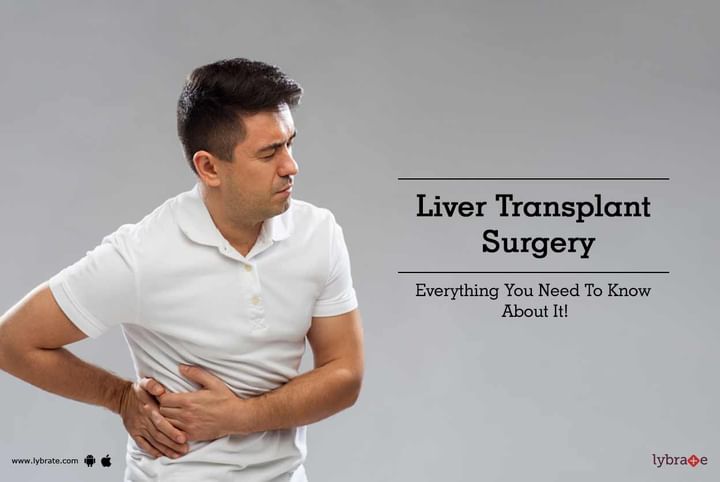Liver Transplant Surgery - Everything You Need To Know About It!
As you might already know, the liver performs some important functions for the body such as removing toxins from the blood stream, regulating the immune response, processing hormones, nutrients, and medications, production of bile, production of protein, etc. That’s why the liver is considered to be the most important organ of the human body, and it’s vital to have a healthy, functioning liver. However, in some cases, a person needs a liver transplant. This is a complex surgical procedure that aims at replacing a non-functioning liver with a healthy liver from a donor.
Why is liver transplant done?
Liver transplant is mostly done in cases where the conditions cannot be controlled with conventional treatment or people suffering from cancer. A liver failure generally happens over a period. But, there are cases where the liver might fail in a matter of days. This condition is termed as an acute liver failure.
Chronic liver failure, on the other hand, happens gradually and can be a result of a lot of factors; the most common being liver cirrhosis. The latter can befall due to reasons such as hepatitis C and B, liver fat, Wilson’s disease, alcohol abuse, etc.
When do you need a liver transplantation?
The liver carries various functions important function in the body. Any disease or damage to it can affect the functioning of many other organs and total body functioning. However, the good thing is that liver can regenerate itself and only when it is damaged to an extent that affects this regeneration process; that one needs to look at the various treatment options. Liver transplant is recommended as the last resort in case of serious life threatening liver diseases like the following-
- Chronic liver failure
- Liver cirrhosis
- Acute hepatic necrosis
- Auto immune hepatitis
- Viral hepatitis
- Cancerous tumors in the liver
- Other metabolic disorders caused by the liver
For you to be eligible for a liver transplantation it is a must to remain sober for at least 6 months before the procedure happens.
Who can donate healthy liver for transplantation?
Ideally, a healthy liver is available for transplantation once the organ donor has died. However, due to the shortage of cadaver livers, transplantation of a portion of a healthy liver from a living donor was first attempted in the late 1980s. Today living donor liver transplantation (LDLT) is a common practice in quite a few medical institutes where up to 70% of the right side of the healthy liver is taken from the donor.
Apart from the liver portion, a small part of a blood vessel in the leg is also removed from the donor’s body to connect the donated liver portion to the recipient. Due to this complex process, the donor may need a hospital stay for a week or longer. During this time the donor’s liver begins to heal and regenerate itself. Full regeneration generally takes six to eight weeks. In case of the recipient, it takes a bit longer for the transplanted portion to reach full function and the appropriate size. Thus the ability of the liver to regenerate helps both the donor and recipient to have a normal functioning liver in some time.
Risks and Benefits of Liver Transplantations
A good transplant centre ensures that all the safety measures are followed during the liver transplantation by the transplant surgeon and there is no risk of complications like bleeding, infection, blocked blood vessels bile ducts in the liver. A successful liver transplant increases the life span of the donor by a few years. However, the new liver can also get infected with hepatitis if it is not treated alongside. Also, relapse to alcohol use after transplant causes damage to the new liver, so stay sober and stay healthy.
What are different phases involved in the process?
- The first part of the process involves identifying a transplant centre that is reliable, trustworthy and performs enough transplants in a year. It is important to figure out the survival rate, factor in the cost, access the additional support that the centre can extend, etc.
- The next part is the evaluation. Any hospital evaluates a person with three things: A. whether the body is healthy enough to support medications for the rest of the life. B. Whether there exists any pre-medical condition that can jeopardize the procedure. C. If the patient is willing to follow the treatment plan for the rest of the life.
- Another phase that enters here is the testing phase. Some of the typical tests that are conducted include imaging test of the liver, basic laboratory tests, nutritional counselling, heart tests, routine health exam, financial counselling, etc. Once these procedures are over and done with, the selection panel of the centre meets to discuss the case and put the patient on the waiting list.
Is there a post-surgery procedure?
Once the patient is matched and the surgery takes place, a patient is likely to be in the intensive care unit for a few days followed by frequent check-ups for the first few months and the medicine continues for the rest of the life.
In case you have a concern or query you can always consult an expert & get answers to your questions!



+1.svg)
